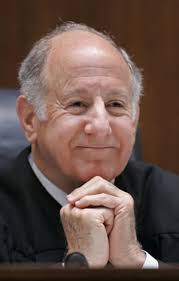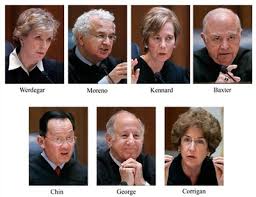


Ronald George & the California Supreme Court
Dr Z
Joseph Zernik, DMD, PhD
PO Box 526, La Verne, CA 91750; fax: 801 998-0917; email: jz12345@earthlink.net
The favor of a response within 10 business days was requested.
December 18, 2009Hon Ronald George, Chief Judge
Supreme Court of California
350 McAllister Street
San Francisco, CA 94102-4797
By USPS certified mail.
Re: Case management systems (CMSs) of the Superior Court of California, County of Los
Angeles.
Dear Chief Justice George:
In the process of preparation of papers for publication in peer-reviewed scholarly journals and also in
preparation for presentations in scholarly conferences, I find it necessary to again approach you and
request your comments regarding Sustain the CMS of the civil division of the Superior Court of
California, County of Los Angeles. The overriding question, raised in my previous letters, was
regarding your role, if any, in the overall decision making process, in the definition of the systems
specifications, in validation of its integrity, and in its final installation and operation as we see it today.
Serious concerns were raised regarding integrity of the system and your official biography indicated that
you served in leadership positions at the Los Angeles Courts around the years that the system was
installed. Doubtlessly, the installation of the system amounted to a sea change in the administration of
the courts. Therefore, it was extremely unlikely that those in leadership positions were uninvolved, or
unaware of critical decisions that were made in this regard.
Decisions, then made, reshaped the justice system in Los Angeles County. Major detrimental effects on
the administration of justice and on the Human Rights of the 10 million LA County residents were
attributed to the CMSs then installed in the civil and criminal courts. Therefore, I would be grateful for
any comments that you would be willing to provide on the record in this regard.
As it stands today, three cases were likely to be at the focus of the presentation: Galdjie v Darwish
(SC052737), Marina v LA County (BS109420), and Sturgeon v LA County (BC351286). The first was
an example of how the system was employed to deprive a person of property, the second how it was
employed to deprive a person of liberty, and the third how it was employed to deprive all 10 million
residents of LA county of the prospect of honest court services in years to come. In all three cases, the
Presiding Judge and Clerk of the Court denied repeated requests to certify the cases as matters that were
in fact litigated under the jurisdiction of the Superior Court of California, County of Los Angeles. They
denied repeated requests to certify the respective judges as duly assigned to such matters, and the
respective judgments as judgments of the Superior Court of California. It was alleged that such vague
and ambiguous conditions could never have emerged had it not been for the installation of the CMSs at
the LA Court and the manner in which they have been operated ever since.
In the latter two cases, the Presiding Judge and Clerk of the Court also denied repeated requests for
access to public records - the registers of actions (California dockets) to inspect and to copy. In the
former case, where access to the register of actions was gained, it provided what must be deemed
conclusive evidence of nothing less than the operation of an enterprise by a racket at the court.
Moreover, in all three cases other courts were involved in the matters as well, calling into question their
integrity as well.
Such conditions prevailing in the Los Angeles Courts for almost three decades could not possibly escape
the notice of federal law enforcement agencies. However, when the question was raised before the
highest level officers of the US Department of Justice last year, through congressional inquiries, on my
behalf, responses of such officers were less than honest.
Obviously, such claims and such allegation were not lightly made. Therefore, one would hope that you
would favorably consider my request and provide some input regarding such serious concerns and
your role in shaping the justice system of Los Angeles County, as we know it today.
Wishing you and your family happy holidays and the best for the New Year!
Truly,
Joseph H Zernik
PS
Needless to say, I am no attorney. My relevant professional training was remote at best as a research
scientist in biochemistry and molecular biology. The only expertise which I might be able to claim, and
which I did not even know I possessed until a few years ago, was in analyzing word and computer data
patterns and identifying fraud in large database management systems. As a child I was identified as
gifted and was sent to computer classes in a high level engineering school using mainframes and
punch cards. I was not attracted to the field, and never used my computer skill professionally afterwards.
However, in recent years, I realized that I was well qualified in analyzing systems that most would
consider user unfriendly, and with no direct access to the databases or the code, which most fraud
experts would consider quintessential:
- An analyst confirmed concerns I raised regarding the central accounting system of a public corporation in the healthcare field.
- Complaint I filed with the California Department of Education regarding a school district electronic pupil educational records, and separately regarding the management of the database of the California Commission on Teachers Credentialing, ended up a year and a half later in determination of "violation of the law", and the hasty departure of senior administrators.
- In January 2007, barely a month after hearing the name Countrywide for the first time I filed a complaint with FBI correctly diagnosing the large scale fraud in EDGE - its underwriting monitoring system. In March 2007 I also provided FBI a correct early estimate at hundreds of billions of dollars of the liability to US taxpayers - and received a death threat in return.
- My correct diagnoses of courts CMSs was probably best demonstrated in Fine v Sheriff (09-71692) at the US Court of Appeals for the 9th Circuit. I correctly predicted the intention of that court to issue a sham order (Dkt #4) in response to the Emergency Petition of the falsely imprisoned Richard Fine. I therefore filed my protest in advance (Dkt #2) - an Ex Parte Request for a leave to file papers in a sham court action.
Presiding Judge Charles McCoy
Clerk of the Court John A Clarke
Others
No comments:
Post a Comment